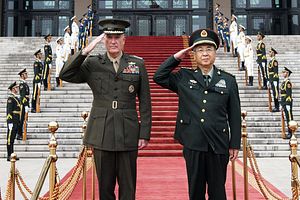The gossip that has been spreading for months about the fall of General Fang Fenghui was finally verified. On January 9, China’s state news agency Xinhua published a brief statement with only 82 Chinese characters, announcing that Fang, former member of the Chinese Communist Party’s (CCP) Central Military Commission (CMC) — the highest body that controls China’s military — and former chief of staff of the CMC Joint Staff Department, “has been transferred to the military prosecution authority on suspicion of offering and accepting bribes.”
Xinhua added that the transfer was made upon approval of the CCP Central Committee, without giving more detail.
Although the statement still claimed that Fang is only under suspicion, it’s almost certain that Fang will face life in prison based on the statement’s wording and on previous cases involving China’s high officials or military leaders. (By the way, there is another hidden indicator in Chinese politics that is worth keeping mind: usually the shorter the official statement, the more serious the case actually is. For example, Xinhua’s statement on the investigation of Sun Zhengcai, former Chongqing Party leader, had only 37 Chinese characters.)
As The Diplomat has been following, signs that Fang was under investigation appeared in September last year, when he was excluded from attending the CCP’s 19th National Congress, the most important political event held every five years.
Yet before that, Fang, 67, had maintained quite a high profile and frequently showed up in front of cameras. In April 2017, Fang accompanied Chinese President Xi Jinping to Florida and met U.S. President Donald Trump at Trump’s Mar-a-Lago estate. In August 2017, he also met Joseph Dunford, chairman of the U.S. Joint Chiefs of Staff, in Beijing and discussed the North Korea crisis. The meeting was publicly reported at home and abroad. However, weeks later, Fang suddenly disappeared from public and he was abruptly replaced as chief of staff of the CMC Joint Staff Department.
Together with Fang, General Zhang Yang, former director of the military Political Work Department, also disappeared from the public in the same period and was excluded from attending the 19th Party Congress.
Then on November 28, as The Diplomat reported, the information that Zhang Yang “hanged himself at home” on the morning of November 23 was finally released by Xinhua, also in a brief statement.
Notably, Fang and Zhang had worked closely as same-level colleagues for decades in the military. Both of them also had close links to Guo Boxiong and Xu Caihou, the two highest ranking military officiers to have been brought down under the anti-corruption campaign launched by Xi Jinping. Xu died of cancer in 2015 before he could face trial; Guo was sentenced to life imprisonment for bribery in 2016.
Now, history seems to be somewhat repeating itself as the destinies of Zhang and Fang become clearer.
































